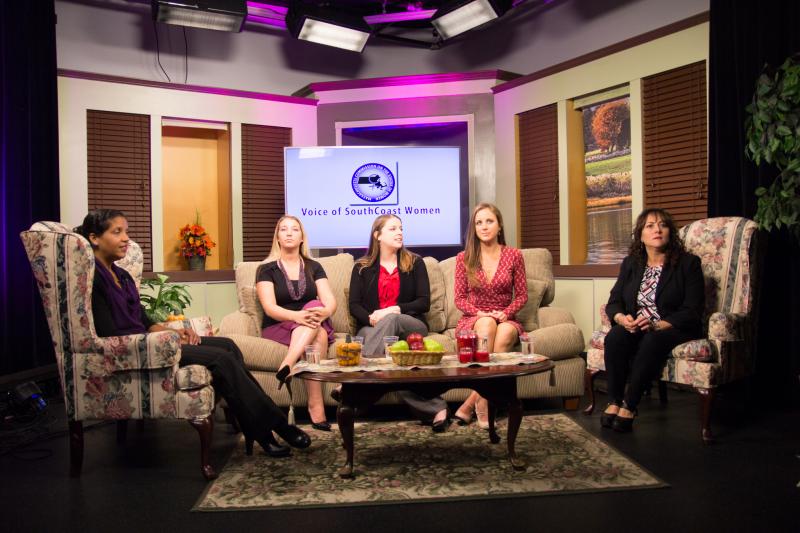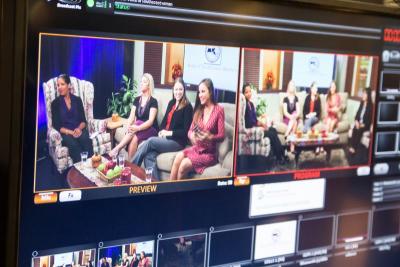DCTV fights back against domestic violence
According to the Bristol County Commission on the Status of Women, domestic violence isn’t a women’s issue, it’s a community issue.
The Commission teamed up with DCTV to decimate myths behind domestic abuse and provide information to victims of abuse as part of the DCTV “Voices of South Coast Women” program.
“Voices,” a monthly program, features a panel of experts that discuss issues that surround women on a local and societal basis.
Host Gail Fortes, Executive Director of the YWCA Southeastern Massachusetts, was joined by Juli Parker, Director of UMass Dartmouth’s Center for Women, Gender and Sexuality; Rebecca Arruda, the Education Director of The Women’s Center; Ashley Bendiksen, Executive Assistant to the Bristol County District Attorney; and Dianna Williams, a commissioner on the Bristol County Commission on the Status of Women to discuss domestic violence against women, how society views victims as complicit in their own abuse and the local resources available to victims and their families, female or male.
The panel defined domestic violence as an imbalance of power within an intimate relationship based upon power and control over one’s intimate partner. The abuse can occur in same-sex relationships, teenage, and elderly intimate partners, not just male-female relationships.
According to the National Coalition Against Domestic Violence, 1 in 3 women and 1 in 4 men are abused by an intimate partner, said Arruda. Domestic violence is a very complex issue that society often oversimplifies. Domestic abuse can go beyond physical abuse to encompass mental, emotional and verbal abuse.
To those who may ask “Why did she get together with him?,” the cycle of abuse does not typically begin on day one of a relationship, Fortes said. Rather, the panel explained, the abuser begins to isolate their victim from family and friends who would be able to identify the relationship as abusive.
Drawing on their own experiences with abusive partners, Hendiksen and Williams described what abusive behavior may initially manifest as. Overly-controlling habits such as monitoring their partner’s whereabouts or being clingy are typical.
More overt abuse may occur as isolated events, where the abuser will apologize to their victim profusely, make them feel as though the event may have been the victim’s fault and proceed to begin the cycle again until the victim is too physically and emotionally worn down to leave, or even recognize that they are being abused.
“Why did she stay?” is often the first questions victims of domestic abuse have thrown at them. Factors like economic insecurity, cultural values and gender roles and fear play a part in why women voluntarily stay in abusive relationships. Many cultures view men as assertive and aggressive, which normalizes their abusive behaviors and convinces women that this behavior is typical of any relationship.
The panel noted that women are often economically tied to their abusive partner, without whom they may find themselves penniless or homeless. Lastly, fear often keeps women from leaving because they fear that their abuser may not be jailed or may come after them for revenge.
The panel promoted their organizations and what they can do for local victims of abuse.
The Women’s Center provides many free services that revolve around “support and advocacy,” said Arruda. They have various shelters for women who may find themselves in situations where their homes are no longer safe for them. Additionally, they provide a multi-lingual, 24-hour hotline, legal and medical advocacy and counseling services to victims.
The District Attorney’s office helps put victims in touch with organizations and programs that specialize in legal advocacy after an abuser has been arrested, said Bendiksen.
In future segments, “Voices of South Coast Women” will focus on women’s health, education, immigration, issues of race and ethnicity, women in politics, media representation of women, everyday sexism and much more.
“I felt it was important to collaborate with local agencies assisting local women and their families to improve their lives on the South Coast,” said Bristol County Commissioner and DCTV Director of Media Cynthia Marland, Ed. D. “We have a magnificent tool here at DCTV, a means to disseminate information...”
Through DCTV, the Commission hopes to “provide a permanent, effective voice for women across Massachusetts” and continue advancing women toward full equality in all areas of life.
“Voices of South Coast Women” airs on channels 9, 18 and 95 on Tuesdays at 10 a.m., Thursdays at 7:30 p.m., and Fridays and Saturdays at 4 p.m.















